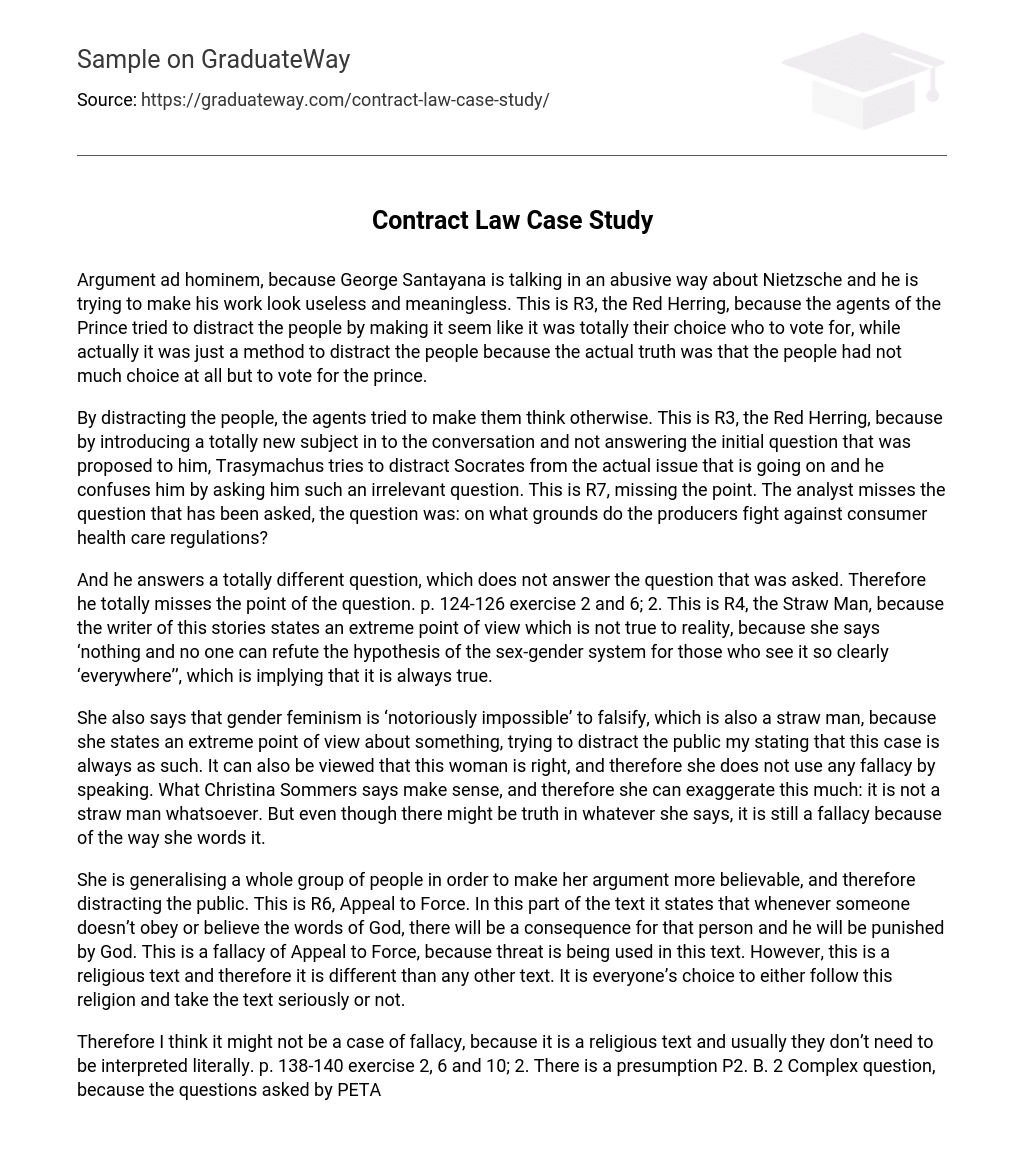Argument ad hominem, because George Santayana is talking in an abusive way about Nietzsche and he is trying to make his work look useless and meaningless. This is R3, the Red Herring, because the agents of the Prince tried to distract the people by making it seem like it was totally their choice who to vote for, while actually it was just a method to distract the people because the actual truth was that the people had not much choice at all but to vote for the prince.
By distracting the people, the agents tried to make them think otherwise. This is R3, the Red Herring, because by introducing a totally new subject in to the conversation and not answering the initial question that was proposed to him, Trasymachus tries to distract Socrates from the actual issue that is going on and he confuses him by asking him such an irrelevant question. This is R7, missing the point. The analyst misses the question that has been asked, the question was: on what grounds do the producers fight against consumer health care regulations?
And he answers a totally different question, which does not answer the question that was asked. Therefore he totally misses the point of the question. p. 124-126 exercise 2 and 6; 2. This is R4, the Straw Man, because the writer of this stories states an extreme point of view which is not true to reality, because she says ‘nothing and no one can refute the hypothesis of the sex-gender system for those who see it so clearly ‘everywhere’’, which is implying that it is always true.
She also says that gender feminism is ‘notoriously impossible’ to falsify, which is also a straw man, because she states an extreme point of view about something, trying to distract the public my stating that this case is always as such. It can also be viewed that this woman is right, and therefore she does not use any fallacy by speaking. What Christina Sommers says make sense, and therefore she can exaggerate this much: it is not a straw man whatsoever. But even though there might be truth in whatever she says, it is still a fallacy because of the way she words it.
She is generalising a whole group of people in order to make her argument more believable, and therefore distracting the public. This is R6, Appeal to Force. In this part of the text it states that whenever someone doesn’t obey or believe the words of God, there will be a consequence for that person and he will be punished by God. This is a fallacy of Appeal to Force, because threat is being used in this text. However, this is a religious text and therefore it is different than any other text. It is everyone’s choice to either follow this religion and take the text seriously or not.
Therefore I think it might not be a case of fallacy, because it is a religious text and usually they don’t need to be interpreted literally. p. 138-140 exercise 2, 6 and 10; 2. There is a presumption P2. B. 2 Complex question, because the questions asked by PETA were asked in such a way, that is presupposed the truth of the preposition buried in the question. This is the case for both the questions, they ask for a simple ‘yes’ or ‘no’ answer, but the answer is very complex and contains a lot of information.
This information is presupposed to be the truth. 6. This is defective induction D4, a Hasty Generalisation, because the writer assumes that, because one man has jumped of a building while he was drunk and he looked at the moon in a certain way, that everyone will jump of a building when they look at the moon. Not only is it a hasty generalisation, it is also D3. False Cause, because the writer assumes that the person has jumped of a building from looking at the moon in a certain way, which is obviously not the reason why he has gone insane. This is a presumption P3, Begging the Question, because the way mr. Suzuki argues his statement does not make sense, and does not answer the question. His way of thought is that because his wife’s bone is healed by God, and his dice is made from bone, God can also make his gambling go well. This way of thinking is not correct because his dice cannot be healed, and curing a bone or making someone get lucky with gambling are two totally different things.
Therefore this is a fallacy of begging the question. p. 148-149 exercise 2, 6 and 10. . This is A3, Accent, because the word ‘lick’ in one of the premises, has been changed to ‘fight’ in the conclusion of the argument. Those words differ in meaning and therefore there is a change in emphasis of the words. Thus, the premise and the conclusion of the argument don’t match together. This is A4, Composition, because the writer uses the distributive term of ‘the happiness of a person’ and makes it into a collective term and concludes that what applies for that person, is also applicable for all persons. This is A5, Division, because first, there is a collective term used, which states that ‘sixty men can do a piece of work sixty times as quickly as one man’, and then a more specific term is used which states that ‘one man can dig a post-hole in sixty seconds’. This specific term is then applied to the first collective term, so the mistaken inference is from distributive to collective predication, and therefore it is a fallacy of division.





